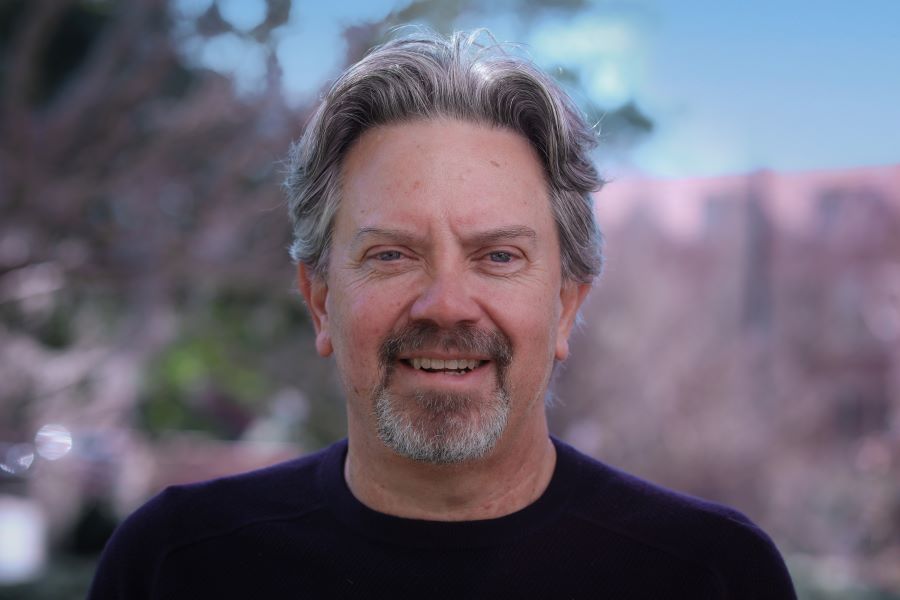Faculty Spotlight: Michael Bishop

Michael Bishop is a professor in the Department of Philosophy, part of Florida State University’s College of Arts and Sciences. He earned his doctoral degree in 1990 from the University of California San Diego and served as an associate professor at Iowa State University and Northern Illinois University before joining FSU’s faculty in 2006. Bishop’s research interests lie in the philosophy of cognitive science, epistemology or the theory of knowledge, and ethics.
What inspired you to choose to study philosophy?
I study philosophy because, as a discipline, it confronts us with two questions we can’t avoid: How should we think about important things? And what choices should we make? These questions are some of the most interesting and valuable ones we face as human beings.
Can you break down your areas of academic interest for us?
In a world of important things and making choices about them, reasoners may think about the great issues of the day — abortion, racism, immigration, climate change, poverty, the economy, war and peace. Reasoners may also think about their life choices — what to study, what job to pursue, how to choose a life partner, how to invest your money, how to treat other people, how to raise your children, and for whom to vote. I don’t study any of those issues directly.
Instead, I study how well we think about those issues. If you haven’t spent much time evaluating how you think, you may not be thinking about important issues as effectively as you could be. The quality of our lives in society often depends on how well we reason our way towards wise judgments and decisions.
Additionally, I’m interested in studying happiness. Most of us want to be happy, and we want the people we care about to be happy. But what does it mean for a person to be happy? Everyone has ideas of what happiness is, but each person has a different definition. What if your picture of a happy life is wrong? It would be tragic if, years from now, you discovered that what you’ve been chasing isn’t happiness after all. This is one of many philosophical debates I’m interested in.
What do you want the public to know about your research and/or academic field?
I offer these insights as conversation starters, not final answers from my research thus far. First, if you want to identify the best critical-thinker you know, don’t look for the smartest or most confident or most articulate person. Don’t look for the person who seems to have all the answers, who gets straight As, who keeps up with the news, or who can solve riddles the fastest. Don’t look for the person who bullies their way into “winning” arguments. Instead, look for the person who consistently raises questions that help you find better answers.
Secondly, happiness is not the most important thing in life. Many admirable people sacrifice their happiness for the good of others. Even so, happiness is important to most of us. What is a sure sign that you’re truly happy? It’s not that your life is full of pleasure or that you have the trappings of success — money, fame, prizes or adulation. The surest sign you’re happy is that you’re consistently participating in a cycle of success-breeds-success with the people and projects you value and enjoy.
What is your favorite part of your job?
I love showing students how philosophy can improve their lives by helping them think more clearly. Many people think philosophy is interesting to contemplate but is very unlikely to be realized or useful. To those people, I would say they are working with an incomplete view of philosophy.
Who are your role models? Are there certain people who have influenced you most in your life and career?
I’ve been lucky to have some fantastic teachers. Two big influences on my life and career are the philosophers Philip Kitcher, John Dewey Professor Emeritus of Philosophy at Columbia University, and Stephen Stich, Board of Governors Distinguished Professor of Philosophy and Cognitive Science at Rutgers University. I could go on forever about how great they are.
A non-academic I’ve never met but whose work I find inspiring is Ricky Jay. He was a sleight-of-hand artist, writer, actor, student of the con, and one-time world record holder in card throwing. His work introduced me to Matthias Buchinger, denoted by Jay as “the greatest German living,” and a historical figure more people should know about due to his uniqueness, skill, and perseverance, despite being born without arms or legs. As Ricky Jay would say, “You wouldn’t want to live in a world where you couldn’t be conned. Because it would mean you’re living in a world where you never trusted anyone or anything.”
What experience has been the highlight of your career so far?
I always think that the highlight of my career is whatever I’m working on at the moment. That’s probably one of my more useful delusions.
Do you have any exciting upcoming projects or goals you’re working towards?
I have some evidence to support that 16 months after my critical thinking class is over, my students are still thinking a lot better than they were before they took my class. Why does my course on critical thinking work? I don’t teach my students the right ways to think; they come to my class already knowing that. I just encourage them to think in more effective ways more often. I’m currently working on a project to investigate if I can teach individuals who aren’t my students to think in ways they know are right.
If your students only learned one thing from you (of course, hopefully they learn much more than that), what would you hope it to be?
I hope my students learn to ask better questions — questions that point them to answers that help them live better lives.
